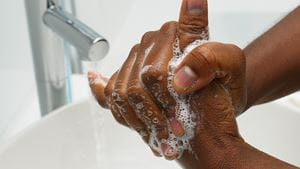
Germs are everywhere – home, work, school, the grocery store, and most other places we visit every day. Keeping those germs from getting us sick is an important daily task for everyone.
The best way to kill those germs is simple: washing our hands. Studies show proper handwashing can prevent 1 in 5 respiratory infections such as cold and the flu, according to the CDC.
Jennifer Gutowski, Associate Director of Infection Prevention with Rochester Regional Health, shares the best times to wash our hands, how to wash them well, and when to use hand sanitizer.
Schedule A Virtual Urgent Care Visit
One of the most obvious benefits of washing our hands is that it prevents illness and infection. The easiest way for germs and pathogens to travel is from our hands to our eyes, nose, or mouth. A simple eye rub or other movement from the hand to these areas of the face can spread germs quickly.
By washing our hands, we are able to stop the germs from getting into our bodies and causing us to get sick – along with anyone else with whom we might come into contact.
Another unexpected benefit of handwashing is its ability to fight antibiotic resistance. This happens when bacteria are not killed by antibiotics and continues to grow. These bacteria become more difficult for providers to treat.
When infections need to be treated with antibiotics, bacteria can become more resistant to treatment. If germs like bacteria are killed by handwashing, they don’t develop into an illness that needs to be treated by antibiotics – which helps to prevent antibiotic resistance.
In order to keep our bodies healthy and hands clean, we can’t just wash our hands – we need to wash them properly. There are four steps to follow to ensure our hands are fully washed.
Certain activities put us in close contact with bacteria or viral particles that could get us sick. The best times to wash our hands are before, during, and after these activities:
If you are out and about and unable to find a restroom or handwashing station to wash your hands, using hand sanitizer is a good alternative.
Hand sanitizer should contain at least 60 percent alcohol in order to be considered effective. Rub the hand sanitizer along all the surfaces of your hands until they are dry – about 20 seconds.
If your hands are greasy or dirty after activities such as gardening, playing outside, camping, or working on machines, hand sanitizer will not penetrate through all the extra layers of grime to fully clean your hands.
Hand sanitizer does clean most viral particles and germs and protects the outer layer of skin. Some studies show cleaning with hand sanitizer keeps germs off of our hands longer than soap and water.
“Taking the extra 20 seconds to wash your hands can save you and those around you from getting sick and getting down and out from an illness,” Gutowski said. “Hand washing is proven to be the most effective way to reduce spreading infection and keeping people healthy.”